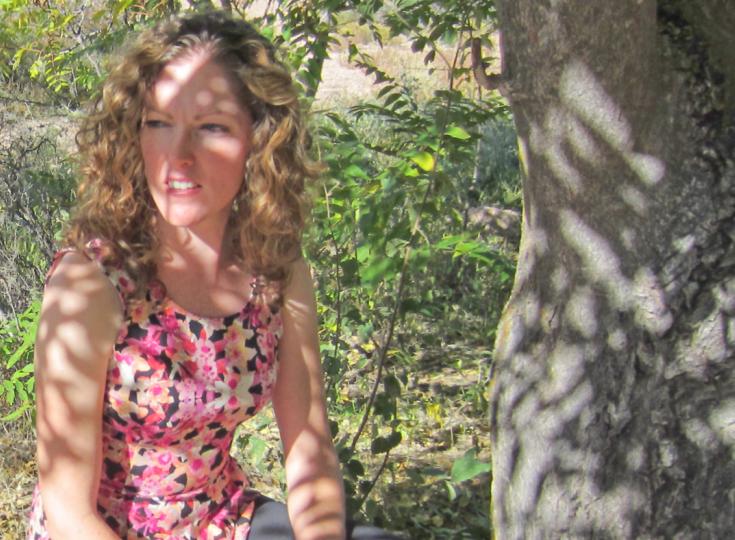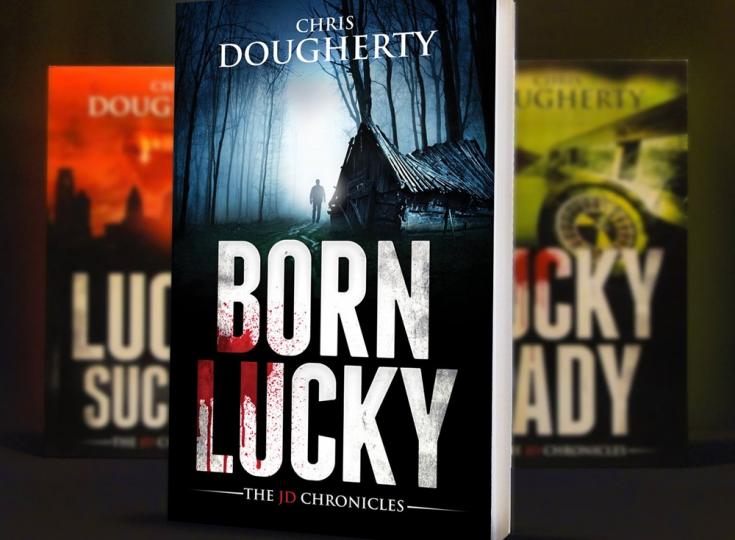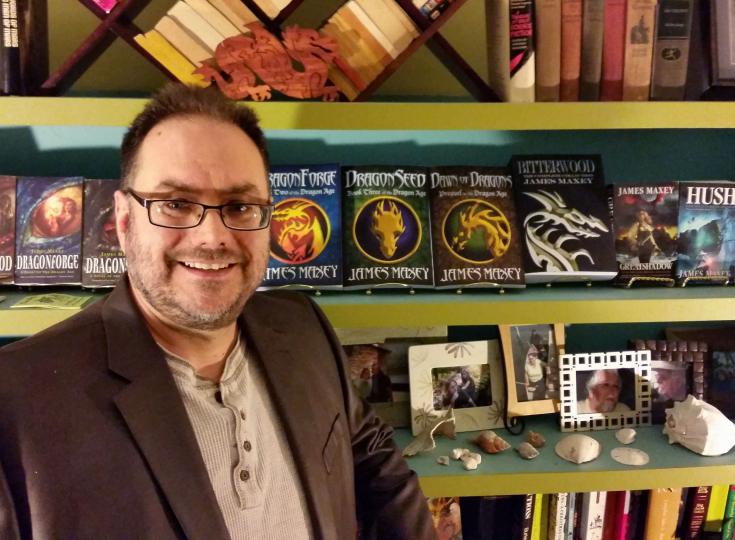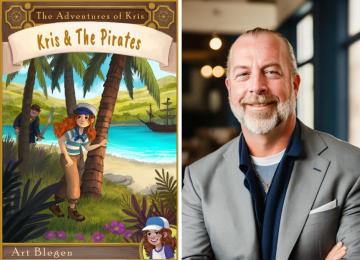Byron TD Smith - Mystery, Drama, and Criminally Good Writing
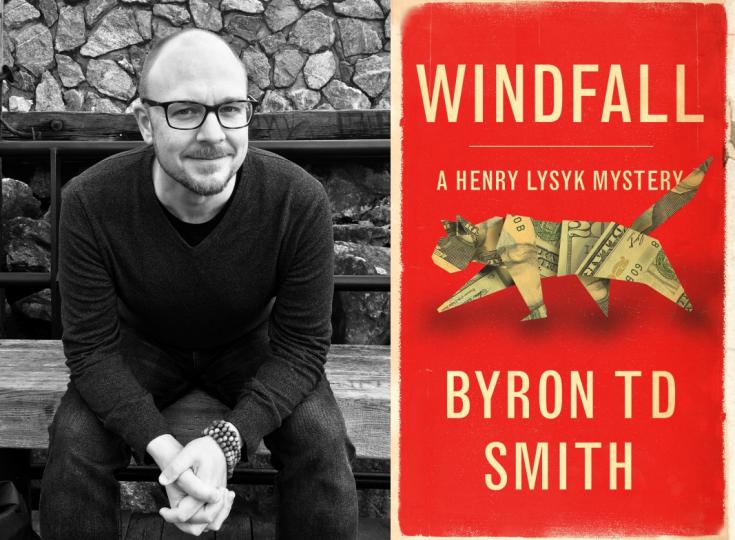
Byron TD Smith lives on Vancouver Island. He writes mysteries when he isn’t accounting, motorcycling, or rambling in the coastal forest. He loves the smell of old books and coffee, and the sound of new wave music from 1987. The location of his secret underwater base remains undiscovered to this day. Windfall: A Henry Lysyk Mystery is his debut novel. As our Author of the Day, he tells us all about his book, Windfall.
Please give us a short introduction to what Windfall is about.
Windfall: A Henry Lysyk Mystery is really about that moment when we think we have nothing left to lose—and how what we do next determines whether we sink further or whether we discover those things that are truly important. At the beginning of the novel, Henry has hit rock bottom. He can’t help sticking his neck out for the underdog and it has cost him his family, his career, and his home. While he wants to be alone to lick his wounds, he’s thrown a lifeline by an unexpected visit from a young niece, Frieda. She is the catalyst that begins forcing him back into the world. But as a deadly treasure hunter follows the trail of a true unsolved heist to Henry’s doorstep, Henry is torn between once again putting everything at stake to help his secretive neighbors and keeping Frieda out of danger. It doesn’t help that Frieda is something of a daredevil!
Tell us more about Henry Lysyk. What makes him tick?
Henry has a fierce sense of justice—except when it comes to himself. He doesn’t resent having given up everything for others—his job, his marriage—but he is realizing that this can’t go on forever. He is always willing do to the wrong thing, for the right reasons. He is wrestling with how to both put everything on the line, and keep for himself the pieces of his life he holds dearest. Henry’s the guy who stopped listening to David Bowie because his wife didn’t like it, but he kept his records. He’s the guy who broke the rules at the bank because he saw local businesses being taken advantage of. And all he’s looking for, for himself, is a roof over his head, his cat, and a good coffee.
What inspired you to write about someone who gets involved in a fifty-year old mystery?
I lived for a few years in a 100-year-old house, which had been converted into five suites. Although you could be alone in your unit, sound travelled clearly throughout the house—music, a shower, the sound of a dog’s tail thumping on the floor. It’s this in-between living, where you are alone with people, in company with strangers. And I began to speculate on what sort of people those others might be. They could be extremely unusual, John-Irving-esque. They could be dangerously Elmore-Leonard-ish. Or, they could harbour secrets and duplicity, as they might in an Agatha Christie or a Perry Mason. In the end, what we’ve ended up with is a great, diverse cast of characters and some compelling secrets – old and new. It’s the old secret, the fifty-year-old crime, that threatens the house and its residents, though… and which ignites Henry’s need to start digging.
Why do you write mysteries? What drew you to the genre?
Puzzles and mischief. I love those moments where something is revealed and you either smack yourself in the forehead for not having put it together, or pat yourself on the back. Honestly, I would argue there is a degree of mystery in nearly all good fiction. Otherwise, if you knew how the tale would end, why would you start? Mystery, as a genre, simply leans into the question of the story early – why were they killed? what was taken?—and tries to come up with the most unexpected answer in an enjoyable, fulfilling way. “Enjoyable”… that’s where the mischief comes in.
Why did you pick a visit from a niece as the catalyst for your story?
There’s an elegant delicateness between uncles/aunts and nieces/nephews. They can be as dear as any family relationship but, importantly, they don’t have to be. That is, there is explicitly a conscious choice in the strength of this bond that is different than, say, father and daughter, or mother and son. As an uncle, myself, I recognize this when my twenty-year-old niece texts me to say hello. Or, when my fifteen-year-old nephew wants to play chess online. In Henry and Frieda’s case, they are still one more step apart as she’s a niece on his ex-wife’s side. They embody the idea that we choose our family.
Besides writing, what other secret skills do you have?
Most are in the bio on my website, so there aren’t a lot of secrets. Motorcycling, French, Japanese, guitar, professional accountant… When watching police dramas at home, I will usually point out the perpetrator early; I will also shamelessly change my mind.
What, would you say, makes a mystery a GOOD mystery?
I have tremendous respect for someone who can pull off a complex plot with a simple explanation. Where the reasons for everything are simple, and where the characters’ actions are so in line with who they are, the final solution will ultimately be a logical line from A to B. It’s how the sleuth’s trail leads all over hell’s half acre trying to find the truth, adding colour, following leads. Where the discovery was an enjoyable challenge and the answer was simple, I close the book thinking that was a good mystery.
What did you have the most fun with when creating Windfall?
The research piece was really engaging, whether that’s the crime, the city of Vancouver, or police uniforms. I have a lot of details in the story in hopes that people may even want to read it twice. But, honestly, the most fun was probably writing Frieda. I had no idea before then that my “inner voice” was an adventure-prone thirteen-year-old girl. But it opened a lot of great storytelling to have someone in the room who will say aloud exactly what the adults are thinking.
What was the most challenging aspect of writing this story?
Great question. The true crime that is woven into the fictional tale of Windfall may be the most captivating unsolved heist of the twentieth century. There are books of non-fiction about this crime. Some of them are very comprehensive and well done, but that is not what Windfall is intended to be. It took a lot of conscious weighing, writing, and re-writing to ensure that Henry’s story wasn’t overwhelmed by the true crime. What made this possible more than anything, was the strength of the cast of characters – Henry, Frieda, and the others. Each has their own unique motivations to become involved, and their own stakes in the mystery.
When starting on a new book, what is the first thing you do?
I start with a premise (“What if something happened”) and then develop the characters. If the reasons that a character is doing something doesn’t ring true, then the plot—to me—won’t hold up. This is especially important when you’re dealing with amateur detectives. It’s pretty clear why a police or a P.I. would want to solve a crime, but why would an accountant? Or a scientist?
Do you have any interesting writing habits? What is an average writing day like for you?
I do have a 9-to-5 as a tax accountant, so I tend to write in stolen blocks of time. This is typicall in the morning, before my sweetheart wakes up. I write in Scrivener on an old MacBook Pro bearing a sticker of a black cat that reads “Lucky 13”. We do have a spare room, but I end up writing all over the house – on the couch, at the kitchen counter, on the deck. Before the pandemic, the University of Victoria library was a great space to write in, with the perfect level of white noise on a Sunday afternoon. I’m looking forward to getting back there!

What are you working on right now?
I’m plotting the sequel to Windfall. People have asked whether I will make it a tradition to include a true crime in the story. The true crime in Windfall is a doozy and perhaps impossible to top. Nevertheless, I have a cunning plan and, indeed, a sort of tradition in mind. One which I think will leave fans very satisfied.
Where can our readers discover more of your work or interact with you?
I can be reached through my website at https://btdsmith.com, or on Twitter @byrontdsmith
